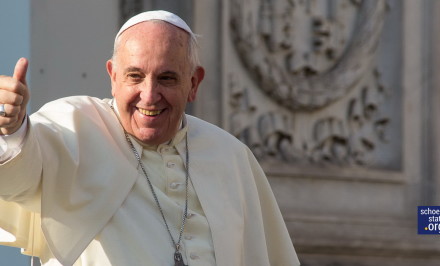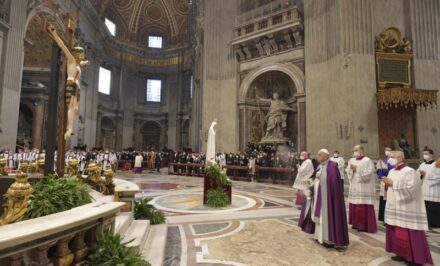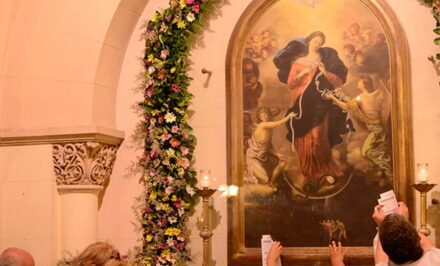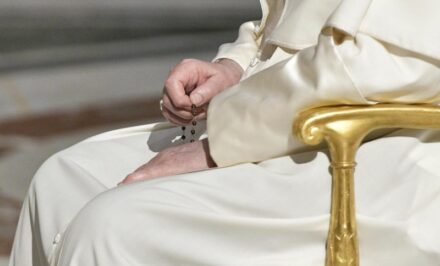 org. Yesterday, Pope Francis visited the Italian island of Lampedusa, for some years now an entry point for many immigrants, a significant number of whom have lost their lives in the surrounding seas. He proceeded to Cala Pisana by car, where he boarded a boat in order to arrive at the Port of Lampedusa by water. The Holy Father was accompanied by fishermen in their boats. During the journey he committed a wreath to the sea in memory of those immigrants who have lost their lives attempting to cross the Mediterranean. The Pope’s arrival at the port at Punta Favarolo was awaited by a group of around fifty immigrants, many of whom were Muslims, living in the reception shelters in Lampedusa. He greeted them one by one and then departed by car for the nearby “Arena” sports field. “Immigrants dying at sea, in boats which were vehicles of hope and became vehicles of death. Since I first heard of this tragedy a few weeks ago, and realised that it happens too frequently, it has constantly come back to me like a painful thorn in my heart. So, I felt that I had to come here today, to pray and to offer a sign of my closeness, but also to challenge our consciences lest this tragedy be repeated. Please, let it not be repeated!”
org. Yesterday, Pope Francis visited the Italian island of Lampedusa, for some years now an entry point for many immigrants, a significant number of whom have lost their lives in the surrounding seas. He proceeded to Cala Pisana by car, where he boarded a boat in order to arrive at the Port of Lampedusa by water. The Holy Father was accompanied by fishermen in their boats. During the journey he committed a wreath to the sea in memory of those immigrants who have lost their lives attempting to cross the Mediterranean. The Pope’s arrival at the port at Punta Favarolo was awaited by a group of around fifty immigrants, many of whom were Muslims, living in the reception shelters in Lampedusa. He greeted them one by one and then departed by car for the nearby “Arena” sports field. “Immigrants dying at sea, in boats which were vehicles of hope and became vehicles of death. Since I first heard of this tragedy a few weeks ago, and realised that it happens too frequently, it has constantly come back to me like a painful thorn in my heart. So, I felt that I had to come here today, to pray and to offer a sign of my closeness, but also to challenge our consciences lest this tragedy be repeated. Please, let it not be repeated!”
Given below are extensive extracts from the Pope’s homily, as provided by the Vatican Information Service.
 “Immigrants dying at sea, in boats which were vehicles of hope and became vehicles of death. Since I first heard of this tragedy a few weeks ago, and realised that it happens too frequently, it has constantly come back to me like a painful thorn in my heart. So, I felt that I had to come here today, to pray and to offer a sign of my closeness, but also to challenge our consciences lest this tragedy be repeated. Please, let it not be repeated!”
“Immigrants dying at sea, in boats which were vehicles of hope and became vehicles of death. Since I first heard of this tragedy a few weeks ago, and realised that it happens too frequently, it has constantly come back to me like a painful thorn in my heart. So, I felt that I had to come here today, to pray and to offer a sign of my closeness, but also to challenge our consciences lest this tragedy be repeated. Please, let it not be repeated!”
The Pope thanked the inhabitants and the authorities of Lampedusa for their solidarity with the immigrants and greeted the Muslims among them who today begin the fast of Ramadan, and added, “The Church is at your side as you seek a more dignified life for yourselves and your families”.
“This morning, in the light of God’s Word which has just been proclaimed, I wish to offer some thoughts to challenge people’s consciences, to lead them to reflection and a concrete change of heart”.
“’Adam, where are you?’ This is the first question God poses to man after his sin. Adam lost his bearings, his place in creation because he thought he could be powerful, able to control everything, to be God. Harmony was lost, man errs and this error occurs over and over again also in relationships with others. The ‘other’ who is no longer a brother or sister to be loved, but simply another person who disturbs our lives and our comfort. God asks a second question, ‘Cain, where is your brother?’. The illusion of being powerful, of being as great as God, even of being God Himself, leads to a whole series of errors, a chain of death, even to the spilling of a brother’s blood! God’s two questions echo even today, as forcefully as ever. How many of us, myself included, have lost our bearings; we are no longer attentive to the world in which we live … we do not take care of that which God created for all of us, and we are no longer capable even of looking after each other. And when humanity as a whole loses its bearings, it results in tragedies like the one we have witnessed.
“’Where is your brother?’ His blood cries out to me, says the Lord. This is not a question directed to others, it is a question directed to me, to you, to each of us. These brothers and sisters of ours were trying to escape difficult situations to find some serenity and peace; they sought a better place for themselves and their families, but instead they found only death. How often do such people fail to find understanding, fail to find acceptance, fail to find solidarity. And their cry rises up to God! I recently listened to one of these brothers of ours. Before arriving here, he and the others were at the mercy of traffickers, people who exploit the poverty of others, people who live off the misery of others. How much these people have suffered! Some of them never made it here.
“’Where is your brother?’ Who is responsible for this blood? In Spanish literature there is a work by Lope de Vega which narrates how the inhabitants of the city of Fuente Ovejuna kill their tyrannical governor, and they do so in a way that no-one knows who carried out the execution. And when the king’s judge asks, ‘Who killed the governor?’, they all answer, “Fuente Ovejuna, my lord”. Everybody and nobody! Today too, this question emerges forcefully: who is responsible for the blood of these, our brothers and sisters? Nobody! That is our answer: it isn’t me, I don’t have anything to do with it; it must be someone else, but certainly not me. Yet God is asking each of us: ‘Where is the blood of your brother which cries out to me?’. Today no-one in our world feels responsible; we have lost a sense of responsibility for our brothers and sisters; we have fallen into the hypocrisy of the priest and the Levite whom Jesus described in the parable of the Good Samaritan: we see our brother half dead on the side of the road, perhaps we say to ourselves: ‘poor soul…!’, and then go on our way; it’s not our responsibility, and with that we feel reassured. The culture of comfort, which makes us think only of ourselves, makes us insensitive to the cries of other people, makes us live in soap bubbles which, however lovely, are insubstantial; they offer a fleeting and empty illusion which results in indifference to others; indeed, it even leads to the globalisation of indifference. We have become used to the suffering of others, it doesn’t affect me; it doesn’t concern me; it is none of my business. The globalisation of indifference makes us all ‘unnamed’, responsible yet nameless and faceless.
Globalization of indifference
 “’Adam, where are you?’ ‘Where is your brother?’ These are the two questions which God asks at the dawn of human history, and which he also asks each man and woman in our own day, which he also asks us. But I would like us to ask a third question: ‘Has any one of us wept because of this situation and others like it?’ Has any one of us grieved for the death of these brothers and sisters? Has any one of us wept for these persons who were on the boat? For the young mothers carrying their babies? For these men who were looking for a means of supporting their families? We are a society which has forgotten how to weep, how to experience compassion – ‘suffering with’ others: the globalization of indifference has taken from us the ability to weep! In the Gospel we have heard the crying, the wailing, the great lamentation: ‘Rachel weeps for her children… because they are no more’. Herod sowed death to protect his own comfort, his own soap bubble. And so it continues… Let us ask the Lord to remove the part of Herod that lurks in our hearts; let us ask the Lord for the grace to weep over our indifference, to weep over the cruelty of our world, of our own hearts, and of all those who in anonymity make social and economic decisions which open the door to tragic situations like this.
“’Adam, where are you?’ ‘Where is your brother?’ These are the two questions which God asks at the dawn of human history, and which he also asks each man and woman in our own day, which he also asks us. But I would like us to ask a third question: ‘Has any one of us wept because of this situation and others like it?’ Has any one of us grieved for the death of these brothers and sisters? Has any one of us wept for these persons who were on the boat? For the young mothers carrying their babies? For these men who were looking for a means of supporting their families? We are a society which has forgotten how to weep, how to experience compassion – ‘suffering with’ others: the globalization of indifference has taken from us the ability to weep! In the Gospel we have heard the crying, the wailing, the great lamentation: ‘Rachel weeps for her children… because they are no more’. Herod sowed death to protect his own comfort, his own soap bubble. And so it continues… Let us ask the Lord to remove the part of Herod that lurks in our hearts; let us ask the Lord for the grace to weep over our indifference, to weep over the cruelty of our world, of our own hearts, and of all those who in anonymity make social and economic decisions which open the door to tragic situations like this.
“In this liturgy, a penitential liturgy, we beg forgiveness for our indifference to so many of our brothers and sisters. Father, we ask your pardon for those who are complacent and closed amid comforts which have deadened their hearts; we beg your forgiveness for those who by their decisions on the global level have created situations that lead to these tragedies”.
![]()













